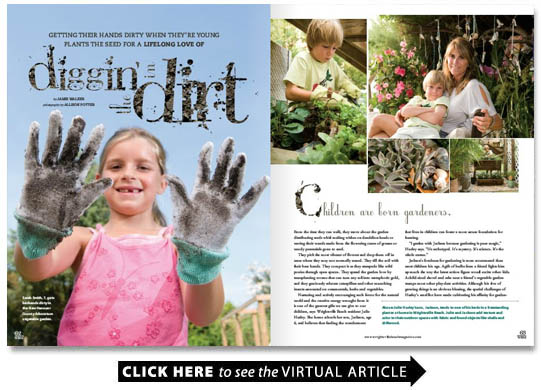Diggin in the Dirt
BY Jamie Walker
Children are born gardeners. From the time they can walk they move about the garden distributing seeds while making wishes on dandelion heads or waving their wands made from the flowering canes of grasses or woody perennials gone to seed. They pick the most vibrant of flowers and drop them off in areas where they may not normally reseed. They till the soil with their bare hands. They compact it as they stampede like wild ponies through open spaces. They spread the garden love by transplanting worms that can turn any soil into metaphoric gold and they graciously relocate caterpillars and other munching insects unwanted on ornamentals herbs and vegetables. Nurturing and actively encouraging such fervor for the natural world and the creative energy wrought from it is one of the greatest gifts we can give to our children says Wrightsville Beach resident Julie Hurley. She home schools her son Jackson age 6 and believes that feeding the wonderment that lives in children can foster a more secure foundation for learning. “I garden with Jackson because gardening is pure magic ” Hurley says. “Its archetypal. Its mystery. Its science. Its the whole entree.” Jacksons fondness for gardening is more accentuated than most children his age. A gift of bulbs from a friend lights him up much the way the latest action figure would excite other kids. A child-sized shovel and rake near a friends vegetable garden trumps most other play-date activities. Although his love of growing things is an obvious blessing the spatial challenges of Hurleys small lot have made cultivating his affinity for gardening a bit enigmatic. Her solution has been to garden wherever she can in the most delightful eco-friendly way possible. Visitors are welcomed by an array of planters varying in size arranged around and adjacent to an ornate wooden bench calling guests up the stairs to the home on the water. Succulents spill from their containers thriving in the baking summer heat. “Jackson has always been taken by succulents ” Hurley says adding that the child is fascinated by the fact that there are plants that can store much of what they need in their leaves. “Jackson is usually in charge of selection and design ” Hurley says explaining how he is largely in charge of placing planting and caring for the plants he selects. And he has since she adds developed a consciousness of the requirements of living things. They buy from locally owned garden shops and talk about each plants needs including drought tolerance or intolerance sun exposure and space requirements. While container gardens can satisfy a thirst for the joys of gardening the possibilities are endless when garden space is ample. Children can be encouraged to explore the simplest of gardens through accessibility to child-sized hand tools garden gloves and watering cans. Exploring the garden with them while noting daily and seasonal changes hones observation and exploration skills. Indoor seed-starting can help children build a connection with the life cycle of plants while caring for seedlings can foster a sense of responsibility. Planting a rainbow garden with bulbs in the fall or favorite annuals by seed in early spring can be a crowd-pleasing enriching endeavor. Children can be included in the selection process and ponder what needs to be done before planting in order to produce strong flowering plants. Is the soil adequate? Are the plants sun-loving or shade-loving? When do they bloom? As the plants grow the discussion may continue and when the flowers appear rejoice. The discussion can travel full circle by calling attention to the all-important pollinators that continue to celebrate through the spring and summer. Although vegetable gardening can be intimidating these are likely the most noteworthy of botanical magicians and can leave children in awe or at the very least with mouthfuls of delicious fresh veggies. If the interest is there but space or time doesnt allow there are several community gardens throughout Wilmington that welcome new members. Exposure to aesthetically inspiring established gardens such as those at the Arboretum can also excite children about the possibilities of gardening. Discuss the difference between the full bursting annuals and the dainty flowering perennials. Tour the robust vegetable garden the grounds around the pond and the greenhouses. Reflecting upon the labor involved in all of these gardens can raise a childs awareness of the care that living things need and can increase consciousness of sustainable and less-sustainable garden choices. L-eslie Kammer 4-H Youth Development Director at the Arboretum says that there are many programs offered specifically through the 4-H program that can help nourish childrens natural appreciation for growing things. A 4-H “Get growing” camp offered to 9- through 12-year-olds in late June received praise from both parents and kids. The children studied container gardening and hydroponics under New Hanover County Consumer Horticulture Director Ken Wells by planting in unlikely containers brought from home old shoes Coke bottles inflatable bowls and even a purse. They spent mornings in the vegetable garden on site harvesting the fruits of much labor and discussing the many facets of edible gardening. Kammer also oversees the Junior Master Gardener program currently offered to third- through fifth-graders in Brunswick and New Hanover counties through the school system as well as independently formed groups. The Junior Master Garden Handbook is a great resource for any family interested in garden education and especially for home-schooling families. It can be purchased through the arboretum or at www.jmgkids.us. With enriching activities and holistic organic approaches to gardening the handbook is sure to engage children of all ages. Kammer says that she loves watching children grow up through the program. “It gives them a sense of community.They start to feel that they have something to contributesomething to give back.” And that she says is something to see. Helene Icard lead teacher at Parents Community Preschool for more than twenty years says that garden education is essential to the curriculum. In the fall children delight in the swamp sunflowers and flowering camellias and decorate their classroom with their explosive blooms. During the winter in the preschools garden the students observe birds that visit feeders suction-cupped to classroom windows. They care for plants in their terrarium where they witness the life cycle of butterflies praying mantes and ladybugs. And in late winter they start the seeds that will constitute their spring and summer garden. “Its important for kids to see things growing ” Icard says “For them to learn that plants need taking care of.” Icard adds that while she encourages nature-based play in every way possible most of the childrens garden exploration occurs organically. On a typical spring day children can be found filling watering cans from the schools rain barrel picking sweet peas from the vine munching on lettuce and sucking the nectar out of honeysuckle. Garden soil is mixed with water to form mud soup and is garnished with a sprinkling of vegetation. Icard known as “Teacher Helene” to her students says that she can see the childrens faces change when theyre delighted by natures offerings. Carrying handfuls of camellias noticing that a seed is about to sprout or biting down on a crispy snap pea gives them a satisfied glow. She says that their desire to participate in the natural world is contagious. Some PCP parents say that the very same glow has been known to appear on Icards face when offered a bowl of mud soup or receiving a bouquet of swamp sunflowers. After all as Teacher Helene is fond of saying “Its only natural.”

